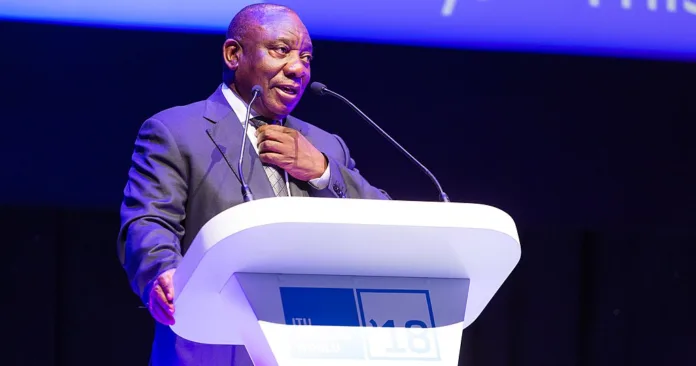uMkhonto weSizwe party chief whip accuses the president of deception and criticizes the influence of the DA in a parliamentary address
Dr. John Hlophe, the Chief Whip of the uMkhonto weSizwe (MK) Party in Parliament, has sharply criticized President Cyril Ramaphosa’s recent address at the opening of Parliament in Cape Town. Hlophe described the speech as “appalling” and accused Ramaphosa of dishonesty, suggesting that the speech was likely written by members of the Democratic Alliance (DA).
Hlophe, the former judge president of the Western Cape, voiced his disapproval following Ramaphosa’s speech, which marked the ceremonial opening of Parliament. He argued that the address was not prepared by the president himself but rather influenced by the coalition parties, particularly the DA. “The speech was appalling, to say the least,” Hlophe asserted. “It is very clear the president did not prepare the speech himself. If anything, it is the parties in the GNU; my guess is that it was prepared by DA members.”
He further claimed that the DA’s white members were notably enthusiastic during the speech, suggesting that the address was tailored to please the Government of National Unity (GNU) coalition partners. Hlophe accused Ramaphosa of presenting falsehoods, particularly regarding job creation statistics. “There are so many lies contained in the speech. I regard the president as a serious liar, a serious-minded liar. Firstly, he says his government, the ANC that he leads, has created more than two million jobs. We are South Africans; we know he is lying. That is not true. The unemployment rate in this country is almost 35 percent now. So, we have lost more jobs than we have created,” Hlophe stated.
Hlophe also criticized the speech for failing to address critical issues such as the situation in Palestine. He attributed this omission to the DA’s influence within the GNU, noting that the parties have differing policies regarding Palestine. “The speech didn’t address critical issues like the issue of Palestine. We know why he is not addressing that. It is because the DA is watching him in the GNU. He can’t address it because the policies differ in respect of Palestine. So, the speech was empty in that regard,” Hlophe added.
In contrast, John Steenhuisen, the leader of the Democratic Alliance and the current Agriculture Minister in the government of national unity, expressed a more optimistic view. Responding to Ramaphosa’s address, Steenhuisen acknowledged the ongoing negotiations within the GNU, particularly regarding the National Health Insurance (NHI). “I do not think that any party to the GNU does not believe that we need to have universal access to basic healthcare for every South African regardless of their economic status,” Steenhuisen stated.
Steenhuisen highlighted the differences in opinion on how to achieve universal healthcare, including the funding mechanisms and the role of private healthcare. “The differences of opinion are on the best way to achieve this, how to fund it, and whether you need to remove the choice for citizens around the private healthcare sector as well,” he explained. Despite these challenges, Steenhuisen expressed confidence in the GNU’s ability to negotiate and find common ground. “I think that we can find each other. I think there is a commitment by the president, both in the Cabinet lekgotla and again tonight, that we will consult each other, we will consult industry players to try and find a way in which we can achieve the goal that we all want – universal access to basic healthcare for all South Africans regardless of their economic status,” he concluded.
Analysis:
Political Perspective:
Hlophe’s critique of Ramaphosa’s speech underscores the deep political divisions within South Africa’s ruling coalition. The accusation that the speech was influenced by the DA highlights the tensions between the ANC and its coalition partners. The potential alienation of the MK Party and other factions within the GNU could lead to further instability and complicate governance.
Social Perspective:
Hlophe’s accusations resonate with a segment of the South African population that feels disconnected from the current administration. His claim that unemployment remains critically high challenges the government’s narrative of economic progress. This discontent could manifest in increased public protests and demands for more transparent and accountable governance.
Racial Perspective:
Hlophe’s comments on the DA’s influence touch on the sensitive issue of racial dynamics in South African politics. By pointing out the enthusiasm of white DA members during Ramaphosa’s speech, Hlophe taps into longstanding racial tensions and perceptions of racial privilege. This could exacerbate racial divides and influence voter sentiment in upcoming elections.
Gender Perspective:
While Hlophe’s speech did not specifically address gender issues, the broader political debate around job creation and economic policies inevitably impacts women, who are often disproportionately affected by unemployment and economic instability. The ongoing negotiations within the GNU regarding universal healthcare could also have significant implications for women’s access to medical services.
Economic Perspective:
The conflicting narratives about job creation and economic progress reveal the challenges facing South Africa’s economy. Hlophe’s critique of Ramaphosa’s claims about job creation brings attention to the high unemployment rate and economic struggles of many South Africans. This economic uncertainty can undermine investor confidence and hinder economic recovery efforts.
